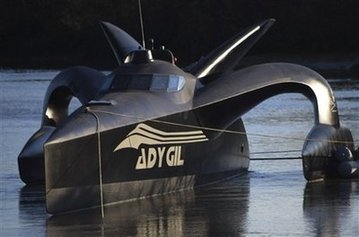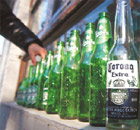Global General
Anti-whaling boat sinks in Antarctica
(Agencies)
Updated: 2010-01-08 14:15
 |
Large Medium Small |
CANBERRA, Australia: The high-tech anti-whaling boat damaged in a collision with a Japanese whaler sank off Antarctica on Friday, but posed no threat to the pristine environment, a conservation group said.
The bow of the Sea Shepherd Conservation Society's Ady Gil was sheared off Wednesday in a collision with a far larger Japanese whaling ship, in the most serious clash in what has become an annual confrontation off the frozen continent.
 In this Oct. 17, 2009 photo released by the Sea Shepherd Conservation Society, their newest vessel, the Ady Gil, is unveiled at a fundraising event in Los Angeles, Calif. A clash Wednesday, January 6, 2009, off Antarctica between the Shonan Maru, a Japanese whaler, and the Ady Gil from the protest group partly bankrolled by former game show host Bob Barker left the anti-whaling vessel badly damaged and each side accusing the other of life-threatening behavior. [Agencies] |
Amid fears the Ady Gil was sinking, a second Sea Shepherd ship, the Bob Barker, began towing it Thursday toward a French research base 185 miles (300 kilometers) to the south, from where it was be shipped to Australia.
But the tow rope snapped after only 23 miles (37 kilometers) because the Ady Gil was filling with water, the tow boat's first officer Peter Hammarsedt said.
The Bob Barker left the Ady Gil to sink and resumed its pursuit of the Japanese whalers.
Hammarsedt said the sunken boat should not leave an oil slick.
"We spent the greater part of yesterday transferring all the fuel, oil and batteries and any other environmental contaminates to begin towing," Hammarsedt told The Associated Press by satellite phone.
He said the decision to tow the stricken vessel toward the coast instead of scuttling it farther out at sea -- where any environmental threat would be less -- was a responsible one.
"We did the best we could with the situation we were given," he said. "The most responsible thing would have been if the illegal whaling vessel the Shonan Maru No. 2 hadn't deliberately split the vessel in two pieces."
| ||||
Japan kills about 1,200 whales a year in Antarctica under what it says is a scientific program allowed by the International Whaling Commission despite a moratorium on commercial whaling. Critics say the program is a front for illegal whaling, and Sea Shepherd sends ships to Antarctica each season to try to stop the hunt -- an effort portrayed on the Animal Planet TV series "Whale Wars."
The whaling is conducted in international waters, but usually within the huge patch of ocean that is designated Australia's maritime rescue zone and that Canberra considers a whale sanctuary.







